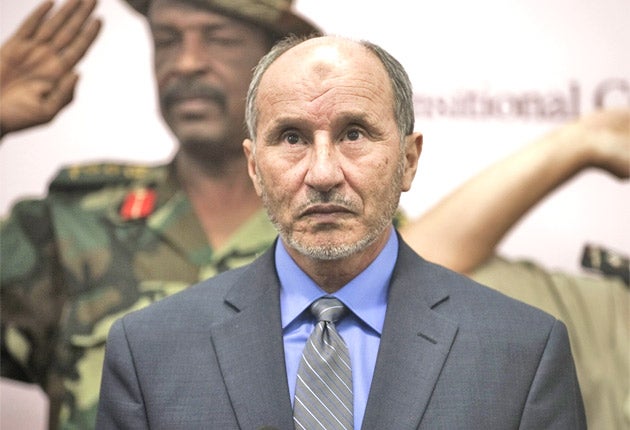Libyan rebel leader dismisses entire opposition cabinet

Libya's opposition administration was dismissed by its leader after threats of retribution from the tribe of the rebel military chief who was assassinated by his own side last month.
The dismissal of the entire cabinet by Mustafa Abdel Jalil was acknowledged as an attempt to reassure the family of General Abdel Fatah Younes and the powerful tribe to which he belonged – the Obeidis – that action was being taken over the death.
However, the move late on Monday was also viewed as a further sign of schism within the rebel movement, beset by internal feuding six months into a civil war which appears to have reached a stalemate, with Muammar Gaddafi still in power in Tripoli.
Yesterday the Gaddafi regime claimed that dozens of civilians were killed in a Nato air strike on the village of Najar, 90 miles east of Tripoli. State television showed charred bodies of three young children and injured women at a hospital. Survivors of the bombing claimed that 20 families had been killed.
Accounts of the attack could not be independently verified. Nato said air strikes were carried out in the area on Monday night and that the Alliance was investigating whether they caused civilian deaths.
Meanwhile, the opposition Transitional National Council (TNC) declared that the planned reshuffle of its national executive would make it more prepared to handle a post-Gaddafi Libya. Officials admitted that the Younes assassination had been a key factor behind the decision.
The opposition's main spokesman, Abdel-Hafiz Ghoga said there had been "shortcomings" in the behaviour of some of the TNC members over the matter. Another senior figure, Fathi Turbel, stated that a shake-up was essential because of the "military, security and media incompetence" that followed the killing.
The TNC's "prime minister" Mahmoud Jibril will form a new cabinet, with some of the ministers expected to be reappointed. It was unclear whether it will include Ali Essawi, Mr Jibril's deputy, widely said to have signed a warrant that led to the arrest of General Younes before he, and two of his aides, were shot and their bodies burnt.
Mr Jibril who, like Mr Jalil, is a former member of the Gaddafi regime, has faced mounting criticism over the amount of time he has spent on "VIP" travel abroad instead of overseeing affairs in Benghazi. Shamsiddin Abdulmolah, the TNC's media director, said: "He has to come back to Benghazi and actually stay here and run things from here, this is essential."
The political turbulence comes at a time when the rebel administration is securing increasing international recognition and has also been involved in commercial negotiations.
Mazin Ramadan, a member of the finance committee, said: "The interruption is not good. But this is not something we are going to worry about. This is not going to stop us." Diplomatic sources say that the Western states backing the rebels are concerned about whether Ali Tarhouni, in charge of the oil industry, is in the new cabinet.
Mr Tarhouni was regarded as one of the more competent figures in the opposition. However, he faced criticism from some TNC members for revealing that General Younes was almost certainly murdered by Islamists within the rebel ranks rather than agents of Colonel Gaddafi, as Mr Jalil and some of his colleagues had maintained.
Meanwhile, General Younes' family and the Obeidi tribe welcomed the TNC overhaul but warned that this was no substitute for the killers, and those who tried to "cover up" the killings, facing justice.
In a joint statement they said: "We only care about justice. We don't seek power. We insist on bringing those involved with the assassination, regardless of their ranks or titles, to be prosecuted by a fair, civilised judicial system."
Join our commenting forum
Join thought-provoking conversations, follow other Independent readers and see their replies
Comments